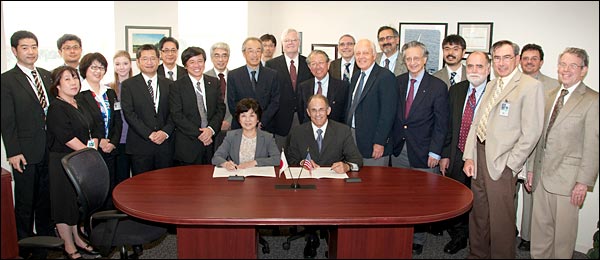RIKEN – BNL Agreement Renewed
August 10, 2012
Maki Kawai, executive director of Japan’s RIKEN, a multidisciplinary lab like Brookhaven, visited the Lab earlier this year and, with BNL Director Sam Aronson, signed a six-year extension of the current agreement regarding the physics program at RHIC and the RIKEN BNL Research Center (RBRC) here at Brookhaven. The agreement originated in 1997, was renewed in 2002, again in 2007, and now in 2012.
 enlarge
enlarge
Signing the six-year extension of the agreement on the physics program at the Relativistic Heavy Ion Collider and the RIKEN BNL Research Center (RBRC) are (front) Maki Kawai, executive director of Japan’s RIKEN, and Sam Aronson, BNL director. With them are members of the RBRC Management Steering Committee, RBRC and BNL observers, RIKEN administrative staff, and other distinguished attendees.
The signing followed a comprehensive review process by several advisory committees, all of which strongly endorsed RBRC’s excellent science. The document was signed at a ceremony following a meeting of the RIKEN BNL Management Steering Committee. Included in the committee’s commendations were RBRC’s potential for making major scientific discoveries related to the most important questions in nuclear and particle physics, fostering international collaboration on three continents, and helping develop scientific leaders.
In one recent collaboration, RBRC, BNL and scientists from the U.S., U.K., and Germany used the RBRC QCDOC supercomputer for much of the groundbreaking research reported in the Physical Review Letters article on the decay of the kaon into two pions that won the 2012 Kenneth Wilson Prize. In addition, RBRC will participate in future developments in RHIC’s physics program of quantum chromodynamics, the theory that describes the nature and interactions of the basic building blocks of the universe.
Said Nicholas Samios, RBRC director, “The program at RBRC has been extremely productive over this 15-year period, with major theoretical, experimental, and computational contributions to the study of Quantum Chromodynamics (QCD). In addition, RBRC has trained over 100 physicists in this field (with 54 having already attained tenure positions) and hosted more than 60 workshops…quite a record!”
2012-3285 | INT/EXT | Newsroom









